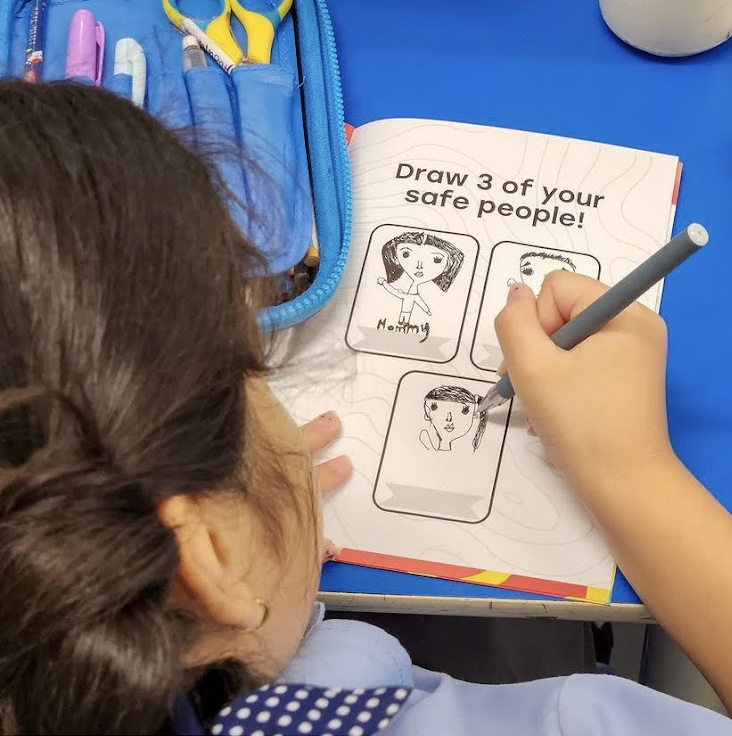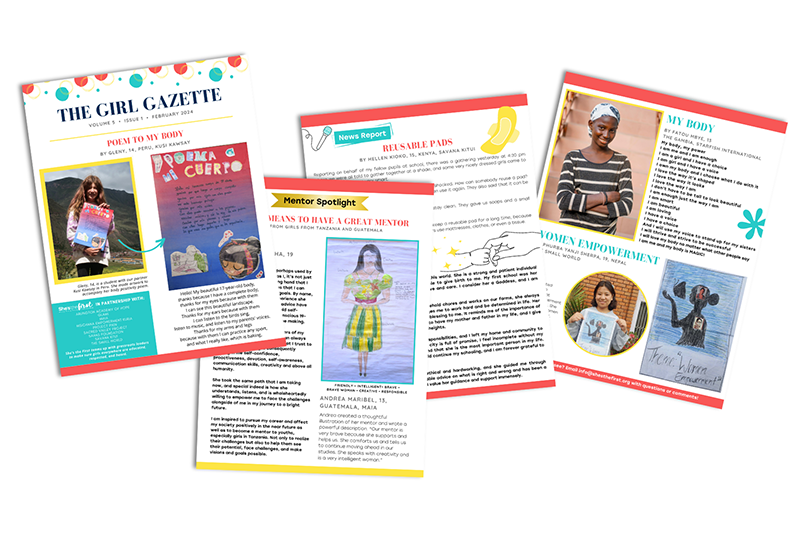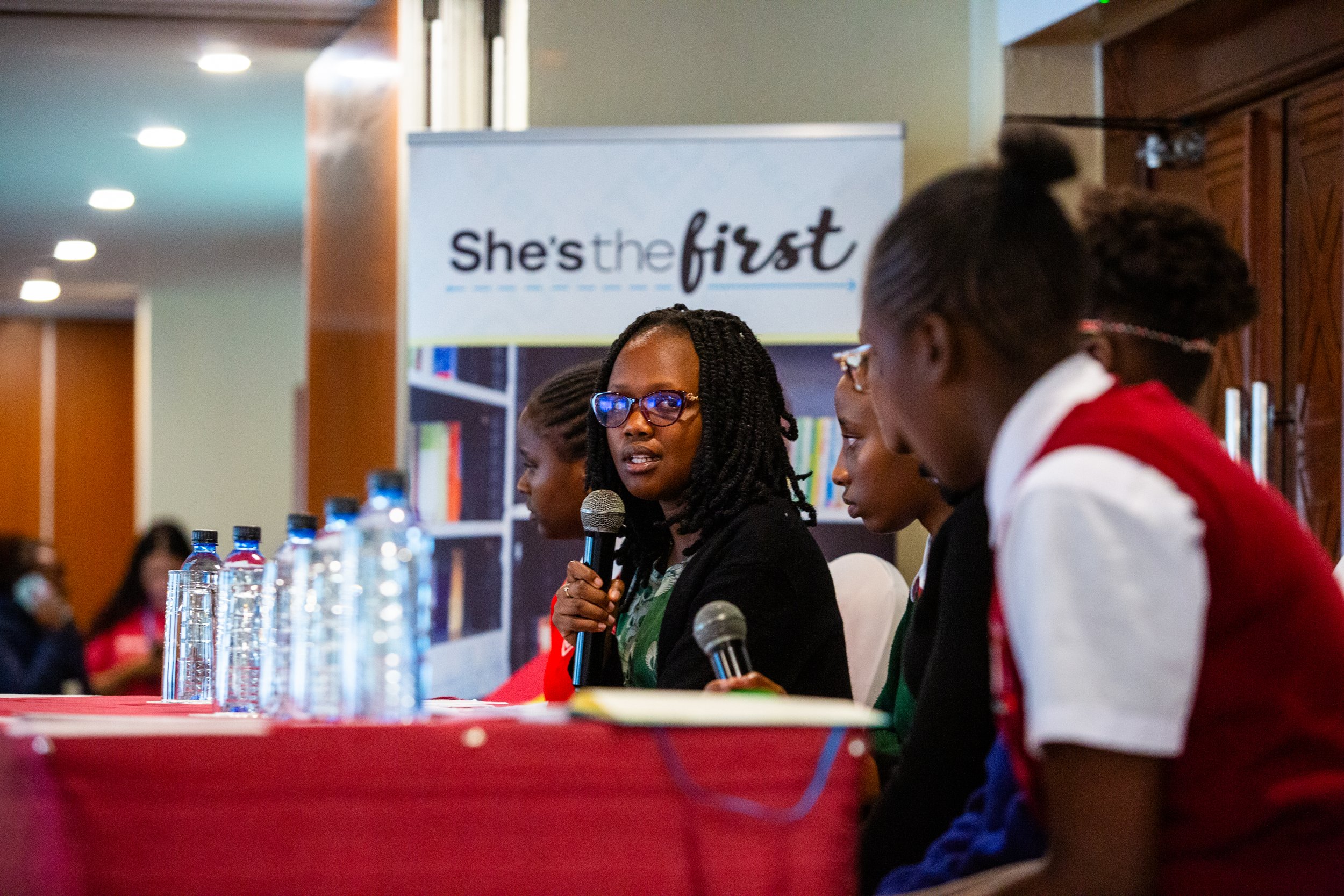Homophobia is a feminist issue. Homophobia and sexism feed into each other. Both forces maintain traditional gender roles and inequalities in our society. Without addressing and eventually eradicating homophobia, the feminist agenda can never be fully fulfilled. It is time to stand up to injustices and senseless impositions of historically patriarchal societies on those who fall outside of rigid norms.
Dear Immigrant Girls: You are Needed.
A First-Gen College Student on Applying During a Global Pandemic
College is a tricky topic in First Generation applicants' households. There’s always a tension between support and willingness for continuous learning. The feeling of loneliness and abandonment of knowledge about colleges are the norms. When everything was changing around me last spring, I found myself collectively questioning how the college application season will work out for me.
Why Feminism is Important to Me
In Conversation with Actress/Activist Malia Baker
Hi, everyone! I’m Dani Antonio, the Community Engagement Intern at She’s the First from the Philippines! This past year, I’ve played a special role in STF’s girl-led advocacy efforts. I have a voice in our social media and I get to participate in influential conversations about girls’ rights.
Recently, I joined an Instagram Live hosted by Malia Baker, a 14-year-old actress and activist. You’ll find her starring as Mary Anne on Netflix’s The Baby-Sitters Club and as Gabby on Nickelodeon’s Are you Afraid of the Dark? Off screen, she uses her powerful platform to advocate for gender and racial justice.
Along with the Co-Founder/CEO of She’s the First, Tammy Tibbetts, and Girls Advisory Council member Anuli Ononye, and myself, Malia talked about her journey as an activist. I was really inspired by her and everyone’s genuine drive and passion in striving for representation. As Malia said, it shows us girls that we have a place at the table.
In this chat, you’ll hear us talk about the She’s the First Girls Advisory Council and Youth Ambassador program. With that being said, I want to encourage you to get involved! Positions are open now and you can apply by June 11th here.
Enjoy the conversation!
What Remote Learning Has Taught Me About Girls & COVID-19
Author: Anika Mukker, She’s the First Campus Community
I’m terrible with dates, but I’ll never forget March 13. That was the day my school announced that we would not be returning for four weeks due to the COVID-19 pandemic. Four weeks turned into seven months, and now I’m in 11th grade through distance learning.
Education has always been one of the most important parts of my life, and my love for learning was the driving factor for me getting involved with She’s the First. Nevertheless, adapting to virtual school has been challenging. Personally, having tangible projects helps me remain organized and engaged, and I value face-to-face interaction with teachers and peers. In fact, most of my closest friendships have all been built out of decade-long connections through school.
“Four weeks turned into seven months, and now I’m in 11th grade through distance learning.”
But, the pandemic has taught us is that we, as people, especially girls, are incredibly creative and resilient. Nowadays, I dedicate more time to planning out my routine and self-care while leveraging technology to maintain my connections and continue learning. I also try to participate as much as I can in online lectures -- asking questions, engaging in discussion, and putting a little more effort into connecting with my teachers.
However, COVID-19 and remote learning have also taught us that we cannot disregard the disproportionate impact of global crises on girls.
In April 2020, She’s the First published their Girls Can’t Wait report which states that over 750 million girls have been affected by the pandemic, and the Malala Fund projects 20 million more girls will not return to school when this is over, for a total of ~150 million girls out of school. A follow-up report published in September 2020 further details the severe impact—from steadily rising teenage pregnancy rates to increases in the number of girls working outside of their homes.
“For many, being taken out of school is more than losing out an education. It’s losing out on a safe space, a place to create dreams, and a network of support. ”
With schools being closed and students being forced to learn remotely, girls are separated from important connections with friends, teachers, and mentors as well as important programs. For many, being taken out of school is more than losing out an education. It’s losing out on a safe space, a place to create dreams, and a network of support.
All of this is coupled with the fact that the COVID-19 pandemic has exasperated the digital divide both on a professional and school level. In the same follow up report, community-based organizations also found that only 25% of girls have access to a tech device to aid in their learning.
With inequitable access to technology, girls' voices are quieted; they are unable to speak out on the issues that affect them, gain equal access to opportunities, and utilize necessary tools for their education. Right now, bridging this divide is more important than ever. Technology is an integral part of remote learning and provides a vital means for receiving an education even while schools are shut down.
“My computer, stable WiFi, and phone are the tools that have truly helped me succeed during this pandemic.”
As much as planning and organization have helped me with distance learning, simple things like my computer, stable WiFi, and phone are the tools that have truly helped me succeed during this pandemic. Without them, my questions would be left unanswered; I would not be able to take hold of opportunities in learning and advocacy.
So let our voices be heard: girls can’t wait. All girls have a right to an education, and we need to keep fighting until even a global pandemic cannot take that away.
Support the COVID-19 Response Fund to support girls’ most urgent needs through this pandemic, including remote access to education, hygiene kits, and more.
About Anika: Anika is a junior at Vista Del Lago High School in Folsom, California and the president/founder of her school’s She’s the First chapter. She’s extremely passionate about girls’ rights, especially when it comes to education and how girls lie at the intersection of so many different issues. Outside of STF, she’s involved in Model United Nations, as she aspires to study international relations in the future. In her spare time, she also loves to draw, write, listen to music, travel, and spend time with her loved ones.
The Right to Quality Education: "I know I'm more than my disabilities"
By: Ariel Kurtz, New York City
The right to quality, free education—as outlined in the Girls’ Bill of Rights which She’s the First co-organized almost exactly a year ago—is extremely personal to me.
And here’s why: I was born three and a half months premature on a snowy Christmas Eve afternoon in the mid-’90s. I’m the oldest of twins. Due to my prematurity, I had complications. Starting from a very young age, I was put in Occupational Therapy and Speech Therapy. When I was in elementary school, I struggled learning how to tie my shoes and putting my hair up in a ponytail.
“Girls with disabilities around the world deserve to have the right to an equal education and to have their accommodations met.”
According to the CDC, 1 in every 4 people have some type of disability. So many people think you only have a disability if it is visible. Walkers, wheelchairs, and hearing aids are examples of some common visible disabilities. Disabilities can also be invisible, like learning disabilities or a chronic illness. In the United States, the American With Disabilities Act requires employers to make reasonable accommodations, if you identify as someone with disabilities. Not every country or community has this in place to protect those with disabilities, to offer the accommodations that they need, especially those in the school systems. So many girls around the world don’t have access to equal education at all, compared to their male counterparts. All girls around the world deserve equal education. Girls with disabilities around the world deserve to have the right to an equal education and to have their accommodations met.
My single mother fought for me to have all the services I needed. When I started school, my twin and I needed different services. We went to two different schools and had two different bus stops and school schedules. After I finished kindergarten, I moved from a town on the South Shore of Long Island to my mom’s hometown on the North Shore of Long Island. My brother and I were going to our new school together, though in different classrooms. The school district we moved to had a myriad of school services for students with disabilities. For the most part throughout elementary school, I was mainstreamed in my school classes and I was active in the Newspaper and Literary Magazine club. I also played the violin and sang in the chorus, just like any other student.
“I know that I’m more than my disabilities.”
When I hit middle school, everything seemed to change. I was really struggling with math (which I never liked) and I was put into a Resource Room program, where for one period of the school day, I would get extra help with my homework and I would now get extra time on tests. I would also now take them in a separate location, different from my classmates. When my friends would later talk about their Spanish or French classes in high school, I would feel left out because I had a foreign language waiver and I wasn’t allowed to take a language. There are some days when I feel frustrated that I can’t carry heavy things or when I still struggle to button buttons, but I know that I’m more than my disabilities.
Everyone needs to know: Girls everywhere deserve to have the right to education and girls with disabilities deserve an equal education and the necessary accommodations.
Ariel Kurtz (She/Hers/Her) is a performer and writer based in New York City who stands for love, intersectional feminism, and accessibility. If you would like to learn more about her, you can visit her website www.ArielKurtz.com.










